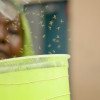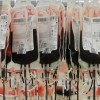We find out how sharks, proud owners of cartilaginous skeletons, make red blood cells without the aid of bone marrow. Plus, we ask whether it's safe to get up close and personal with your television set.
In this episode

00:00 - How do sharks make blood?
How do sharks make blood?
We put this question to Mark Briffa, lecturer in marine biology at the University of Plymouth:Mark - In vertebrates, a major component of the blood is the red blood cell or erythrocytes and this can make up the half volume of the blood and it's these cells that contain haemoglobin and do the job of transporting oxygen around the circulatory system. Now in adult humans, and other mammals these red blood cells are made in the red bone marrow and this is the soft tissue found inside the hollow bones of tetrapods or four-limbed vertebrates which as well as the mammals include amphibians, reptiles and birds. But red bone marrow isn't the only site where red blood cells are produced and in bony fish and cartilaginous fish that don't have bones like sharks and rays, the main places where red blood cells are made are in the spleen and in the front section of the kidneys. And some sharks also have the unique organ called Leydig's organ which is actually absent in the other vertebrates, and this is a large organ that's wrapped around the oesophagus. And although it was discovered way back in 1857, very little is known about exactly what it does, but it's thought that it might play some additional role in producing red blood cells and also in the immune system. So, although bone marrow is important for making red blood cells in humans; in fish, the most important site seems to be the spleen.










Comments
Add a comment